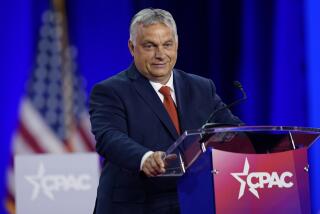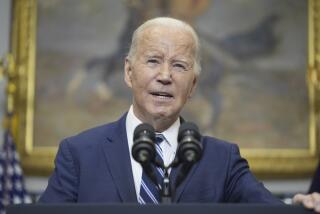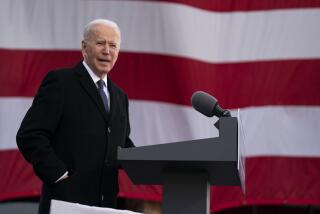A glowing orb and a not-so-glowing review of the GOP healthcare bill: Trump’s week was filled with events he didn’t control
President Trump’s nine-day trip to the Mideast and Europe, his first foreign excursion as president, hasn’t produced any diplomatic breakthroughs so far, but has generated some memorable images.
There was Trump with his hands on a glowing orb in Saudi Arabia; First Lady Melania Trump appearing to swat away the president’s hand as he reached out to her; the president, first lady and First Daughter Ivanka Trump standing stiffly next to a sour-faced Pope Francis; and French President Emmanuel Macron and Trump seemingly trying to turn a ceremonial handshake into a death-grip contest.
Meantime, back home, none of Trump’s problems went away, and the president’s standing in polls sank to the lowest point in his tenure. When the president returns to D.C. — he’s scheduled to fly home Saturday — the investigation of possible Russian efforts to influence the 2016 election will be growing more intense, and the administration’s legislative agenda will be as mired as ever.
Good afternoon, I’m David Lauter, Washington bureau chief. Welcome to the Friday edition of our Essential Politics newsletter, in which we look at the events of the week in Washington and elsewhere in national politics and highlight some particularly insightful stories.
A PIVOTAL POINT IN THE HEALTHCARE DEBATE
The most consequential news of the week may have come on the healthcare front, where twin dilemmas that have shaped the current debate both intensified.
On the one hand, as Noam Levey wrote, the individual healthcare insurance market is becoming increasingly unstable, in part because of long-standing problems with Obamacare, but more immediately because of actions taken by the Trump administration.
More insurers are getting out of the business of covering individuals, as opposed to large groups, especially in rural states. Those who are staying in the individual market are looking for big premium increases in many states.
And when they’re not being quoted by name, insurance executives are scathing in their assessments of how the administration is handling healthcare policy.
“There is a sense that there are no hands on the wheel, and they are just letting the bus careen down the road,” one senior company official told Levey.
An arcane, but important, insurance issue — payment of subsidies to insurers known as cost-sharing reductions — provides the most acute pressure.
The payments reimburse insurers for lowering out-of-pocket costs that low-income Americans would otherwise have to pay. Trump and top aides have repeatedly hinted that they might stop the payments. That would cause many insurers to quit the market entirely.
Some insurance executives have said that administration officials have tried to use that threat to strong-arm them into supporting the Republican bill, Levey reported. Administration spokespeople deny that.
Trump has said repeatedly that if Obamacare collapses, he thinks Democrats will get the blame and will beg for negotiations. Few on Capitol Hill think that’s true.
The biggest problems are hitting Republican states, in part because rural areas generally cost more to insure than urban ones. And in those states, the people facing the biggest cost increases are those who are too well off to qualify for Obamacare subsidies — think small-business owners in red states.
The pressure is squeezing Republican lawmakers.
But Republicans can’t agree on a replacement for Obamacare and, so far, have not been willing to negotiate with Democrats to come up with more modest proposals that would leave the law intact but fix some of its problems.
The squeeze got worse on Wednesday when the Congressional Budget Office issued its report on what the House-passed healthcare law would do.
The number of Americans without insurance would increase by 23 million, insurance markets in many states would become unstable and insurance would become unaffordable for many older, sicker Americans, the report said. It landed as a heavy blow.
In Congress, where everything is about politics, the CBO is the closest thing possible to a neutral referee. Both sides snipe at it. But few ignore it.
Even before the report came out, Senate Majority Leader Mitch McConnell of Kentucky, who seldom says anything substantive in public, told Reuters that “I don’t know how we get to 50 [votes] at the moment.”
GOP senators have been grappling with the healthcare issue in closed-door meetings most of the month. Now, they’re preparing to go home for a Memorial Day recess where many will face healthcare protests.
When they return, the time for decisions will be nigh. It’s still possible that McConnell and his colleagues can find an agreement that would bridge the wide gap between GOP conservatives and centrists. But with only 52 votes, the Republicans have little wiggle room.
McConnell needs to get the healthcare debate finished to clear the way for a subject he cares about more passionately -- tax cuts. One possibility would be to bring a version of the House-passed bill to the floor for a vote, knowing it likely will fall short.
What would happen next?
On both sides of the political divide, some lawmakers believe they could come up with a bipartisan compromise on healthcare that would win majority support. So far, the leadership in both parties has blocked any efforts in that direction.
Might the rising pressure of market chaos be enough to force a change? This summer, we may find out.
HANDSHAKES, LEAKS AND TESTY WORDS
With all the negative things that candidate Trump said during the 2016 campaign about Muslims in general and Saudi Arabia in particular, one might not have predicted that his warmest welcome of a nine-day trip would come in Riyadh.
But as Mike Memoli reported, the Saudis went overboard to make Trump’s arrival memorable. They have reason to, as Tracy Wilkinson wrote: The administration has clearly gone all in on an alliance with the Sunni Muslim Arab states, led by the Saudis, in their fight against the Shiite Muslims, led by Iran.
The pro-Saudi orientation is a traditional Republican approach, reversing the Obama administration’s effort to find a more neutral path that might lead to better relations with the Iranians.
Beyond the ceremonials, the centerpiece of Trump’s visit to Saudi Arabia was meant to be his speech on Islam, in which he avoided the anti-Muslim rhetoric of his campaign, but urged his listeners to “drive out” the supporters of terrorism from their communities.
The Saudi leg of the visit was largely stage-managed by two princes — Trump’s son-in-law Jared Kushner and King Salman’s son, Deputy Crown Prince Mohammed bin-Salman. As Memoli and Molly Hennessey-Fiske wrote, the two have been working on the visit since even before Trump’s inauguration.
Trump hopes that close ties with the Saudis will help bring about a peace deal between Israel and the Palestinians. But in Israel, the second stop of his trip, prospects for a peace agreement seemed no closer.
From there, Trump headed to Rome for a meeting with the pope that seemed destined to be remembered mostly for grim-faced images.
On Thursday, he scolded NATO allies for not spending enough toward their common defense, a repeated theme for him.
As Memoli reported from Brussels, Trump notably did not make a specific pledge to back NATO’s Article V — the promise that an attack on one ally would be considered an attack on all. In the days leading up to the NATO meeting, allied officials had expressed hope that Trump would reassert U.S. support.
The day was a great one for readers of body language: To begin with, there was that handshake with Macron. Later, European leaders seemed to cluster around German Chancellor Angela Merkel and ignore Trump at a gathering. And, of course, there was Trump’s memorable shove, pushing the prime minister of tiny Montenegro out of his way as he moved toward his designated spot for a group photo.
A CHILL OVER GLOBAL WARMING
Among the many topics of disagreement between Trump and the allies is climate change.
As Evan Halper reported, Trump was repeatedly lobbied by leaders including Macron and the pope to abandon a campaign pledge.
Trump has promised to tear up the U.S. agreement to the global climate pact reached in Paris in December 2015. Conservative Republicans don’t like the Paris accord. But many business executives think it’s in their best interests.
Trump repeatedly has delayed making a decision about the Paris accord, highlighting divisions within his White House, Halper reported.
A DEAD ON ARRIVAL BUDGET
Trump was thousands of miles away when his administration’s budget for the coming year was released. The symbolism may have been a coincidence, but was powerful nonetheless. From the White House to Capitol Hill, no one seemed to be think the budget mattered very much.
The budget, with its calls for deep spending cuts on virtually all domestic spending programs, reflects the priorities of Trump’s budget director, Mick Mulvaney, a former member of Congress known for his opposition to federal spending.
There’s not much evidence that it reflects priorities that Trump will actually fight for.
On Capitol Hill, lawmakers largely treated the budget release as a non-event.
“Ultimately,” said Sen. John Cornyn of Texas, a Republican leader, “we will have to come up with a budget ourselves.”
LOSING AGAIN IN COURT
Trump’s proposed temporary ban on travel from several Muslim-majority countries has been like a bad penny that keeps bringing the administration trouble.
This week, it was a ruling from the 4th Circuit Court of Appeals, which scathingly rejected the travel ban.
Trump’s revised executive order “speaks with vague words of national security, but in context drips with religious intolerance, animus and discrimination,” Chief Judge Roger L. Gregory wrote.
Eventually, however, the case is likely to get to the Supreme Court, which has a more conservative majority, as David Savage noted. There, the administration’s arguments may get a more receptive hearing.
Despite the setbacks the administration has experienced in court, the number of refugees entering the U.S. has declined a lot in recent months, according to a new study by the Pew Research Center, based on analysis of State Department data. In October, 9,945 refugees arrived in the U.S. That had dropped to 3,316 by April.
“This decline has been felt by 46 of the 50 states,” said Phillip Connor, a Pew research associate.
Elsewhere on the immigration front, the Justice Department backed away from some of its threats against so-called sanctuary cities, Joe Tanfani reported.
HIGH TIMES
Marijuana entrepreneurs aren’t spending too much time worrying about Atty. Gen. Jeff Sessions and his threats to crack down: There’s too much money to be made, and states are moving to protect the pot industry, Halper reports.
THE BODY SLAM ELECTION
Two months ago, no one would have predicted that a special election to fill Montana’s at-large congressional seat would turn into one of the hottest races of the year, complete with an election-eve assault charge against the GOP candidate, Greg Gianforte.
Gianforte’s alleged assault against Ben Jacobs, a reporter for the Guardian, brought a charge of misdemeanor assault. But it was not enough to keep him from winning in a heavily Republican state, as Mark Barabak wrote.
It’s unclear whether many larger lessons can be drawn from such an idiosyncratic special election: Republicans have now held two of the seats vacated by people who moved into Trump’s Cabinet.
Money and attention will now focus on the third such contest, on June 20, in a suburban district outside of Atlanta where the Democrat, Jon Ossoff, is trying to win the seat formerly held by Tom Price, the secretary of Health and Human Services.
PULLED TO THE LEFT
Even as the Democrats try to win congressional contests on conservative turf, the reaction against Trump has energized the party’s most liberal activists.
The impact was plain as California Democrats gathered for their party convention this past weekend, where a generational shift in power could be clearly seen, Cathy Decker wrote. Figures who have dominated the state party for decades, Gov. Jerry Brown and Sen. Dianne Feinstein, both skipped the event. A new generation was visibly struggling to rise.
The shift is pulling the party to the left. The issue for Democrats, in California as in Georgia, is whether that leftward lunge will endanger their chances of winning in more conservative areas.
ALL THE PRESIDENT’S TWEETS
Twitter has long been Trump’s favored means of pushing his message. We’re compiling all of Trump’s tweets. It’s a great resource. Take a look.
LOGISTICS
That wraps up this week! Essential Politics is taking a Memorial Day break. My colleague Christina Bellantoni will be back Tuesday with the weekday edition of Essential Politics. Keep track of any breaking news and all the developments in national politics and the Trump administration with our Essential Washington blog, at our Politics page and on Twitter @latimespolitics.
Send your comments, suggestions and news tips to politics@latimes.com.
If you like this newsletter, tell your friends to sign up.
More to Read
Get the L.A. Times Politics newsletter
Deeply reported insights into legislation, politics and policy from Sacramento, Washington and beyond. In your inbox three times per week.
You may occasionally receive promotional content from the Los Angeles Times.







